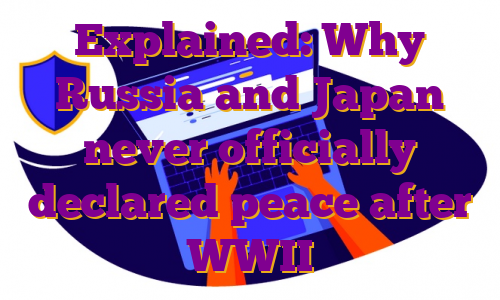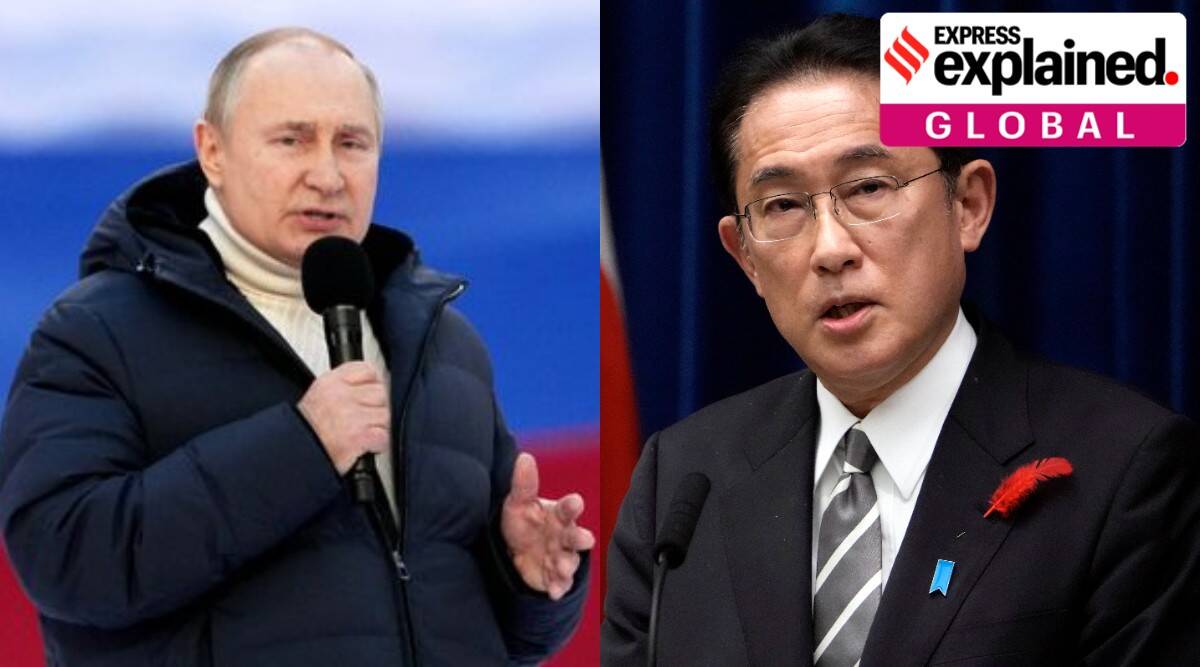On September 2, 1945, the allied forces accepted Japan’s formal surrender, marking the end of the most destructive global conflict of all time — World War II. But nearly eight decades later, Japan and Russia technically remain at war.
The two countries are yet to formally sign a peace treaty to end World War II hostilities. At the heart of the conflict is a group of tiny islands located just off Japan’s northernmost island of Hokkaido.
🗞️ Subscribe Now: Get Express Premium to access the best Election reporting and analysis 🗞️
Now peace talks between the two countries have hit yet another stumbling block — Russia’s invasion of Ukraine. After Japan joined the West in imposing hefty sanctions on Moscow, the Russian foreign ministry announced that it was withdrawing from treaty discussions, accusing Japan of “consciously choosing an anti-Russian course”.
Moscow further announced that it was halting all joint-economic programs between the two countries.
Why has Moscow halted peace talks?
After Russia invaded Ukraine, Japan announced that it was revoking ‘most-favoured nation’ (MFN) trade status as part of its economic sanctions against the country. MFN status is a key principle of the World Trade Organisation (WTO). It ensures non-discriminatory trade between all partner countries of the WTO.
Japan Prime Minister Fumio Kishida’s decision came soon after similar announcements were made by the US, the EU, and the United Kingdom. But since Tokyo and Moscow aren’t major trading partners, the move is unlikely to have too much of an adverse impact on Russia, according to a report by Japan Times.
Kishida further announced that Japan was expanding the scope of asset freezes against Russia and banning the imports of certain products, Reuters reported. Apart from a wide range of luxury products, Japan has banned the export of about 300 semiconductors, computers and communications devices to Russia and Belarus, according to Japan Times.
Soon after Japan’s announcement, Russia asserted that it would not be continuing talks with Japan. “The Russian side, in the current conditions, does not intend to continue talks with Japan on the peace treaty,” the Russian Foreign Ministry said in a statement. It said this was “due to the impossibility of discussing the core document on bilateral relations with a country that has taken an openly hostile position and is striving to cause harm to the interests of our country”.
Russia called off several joint-economic programs and ended a visa-free regime that allowed Japanese people to visit the disputed Kuril islands that were claimed by the Soviet Union towards the fag end of World War II, AFP reported.
Why haven’t Japan and Russia declared peace yet?
Japan and Russia have had a complicated relationship for over a century. But one of the lowest points in Russia-Japan relations played out during the final days of the Second World War, right before Japan’s Emperor Hirohito announced his country’s surrender.
The Soviet Union declared war on Japan and seized a group of islands located near the coast of Hokkaido. All 17,000 Japanese residents were expelled at the time. The islands — known as the southern Kurils in Russia and the Northern Territories in Japan — are at the centre of an ongoing standoff between the two countries.
Since then, while Russia insists that the islands fall under its jurisdiction, Japan maintains that they are an inherent part of its territory and are presently under illegal occupation. The territorial dispute has caused deep rifts between the countries and has kept them from finalising a peace agreement.
After WWII, the Soviet Union refused to sign the formal Treaty of Peace with Japan. Instead, in 1956, the two countries signed a joint declaration “that would technically “end the state of war”. The declaration included an agreement to sign a peace treaty in the future. But this is yet to be achieved.
Why do these islands matter?
Apart from being home to rich fishing grounds, the islands are significant from a strategic perspective. It is here that a large chunk of Russia’s pacific fleet is docked. In fact, over the last few years, Russia has been increasing its military presence on the islands.
In 2016, Russian anti-ship and missile defence systems were stationed here, according to a report by ABC. It has also deployed fighter jets to the islands, much to the ire of Japan’s Foreign Affairs ministry.
Have Japan and Russia tried to negotiate?
Yes, several times. Between 2012 and 2020, leaders of the two countries have held 25 meetings, according to a report by Bloomberg.
Things were starting to look up for Japan in 2018 when Russian President Vladimir Putin and Japan’s former Prime Minister Shinzo Abe agreed that their negotiations should be based on the joint declaration of 1956, which called for the transfer of two of the four islands to Japan. But Russia said Tokyo would first have to acknowledge its sovereignty over the islands.
Then in 2020, Russia amended its constitution, making it illegal to hand over any of its territories.
!function(f,b,e,v,n,t,s)
{if(f.fbq)return;n=f.fbq=function(){n.callMethod?
n.callMethod.apply(n,arguments):n.queue.push(arguments)};
if(!f._fbq)f._fbq=n;n.push=n;n.loaded=!0;n.version=’2.0′;
n.queue=[];t=b.createElement(e);t.async=!0;
t.src=v;s=b.getElementsByTagName(e)[0];
s.parentNode.insertBefore(t,s)}(window, document,’script’,
‘https://connect.facebook.net/en_US/fbevents.js’);
fbq(‘init’, ‘444470064056909’);
fbq(‘track’, ‘PageView’);
.


